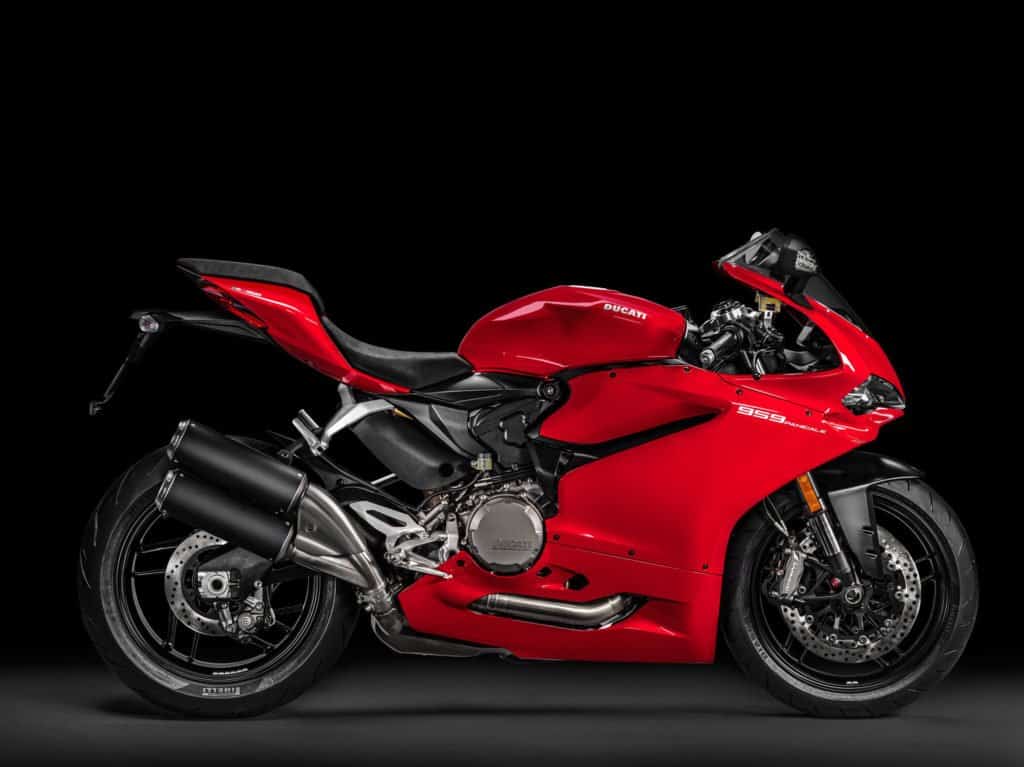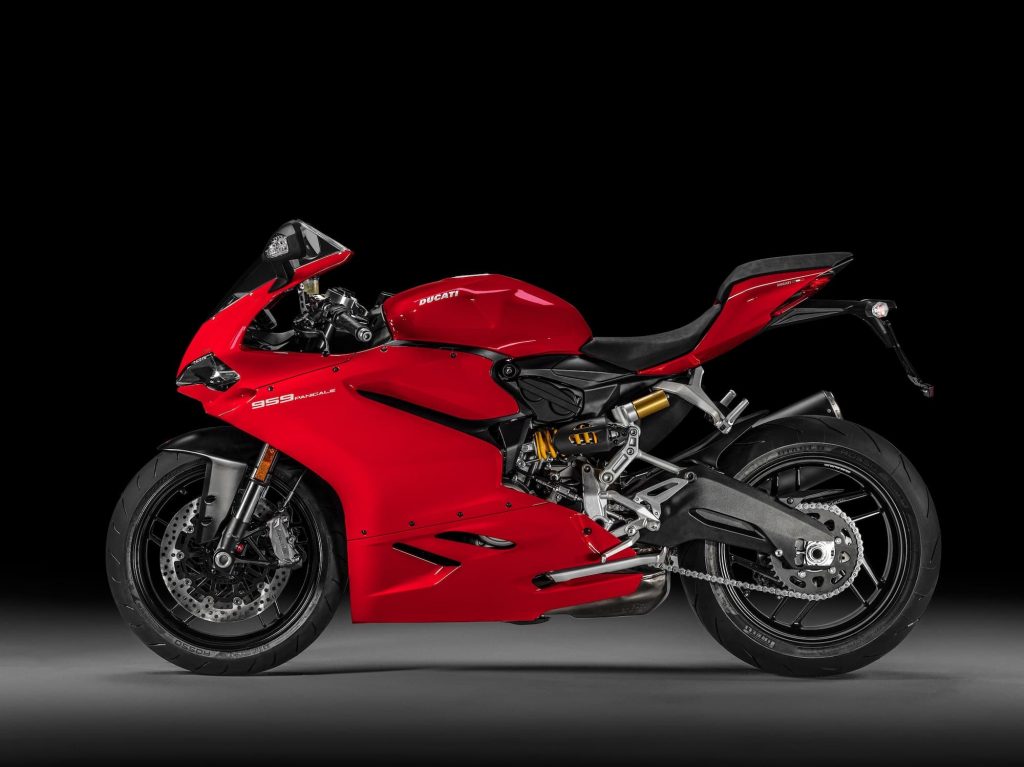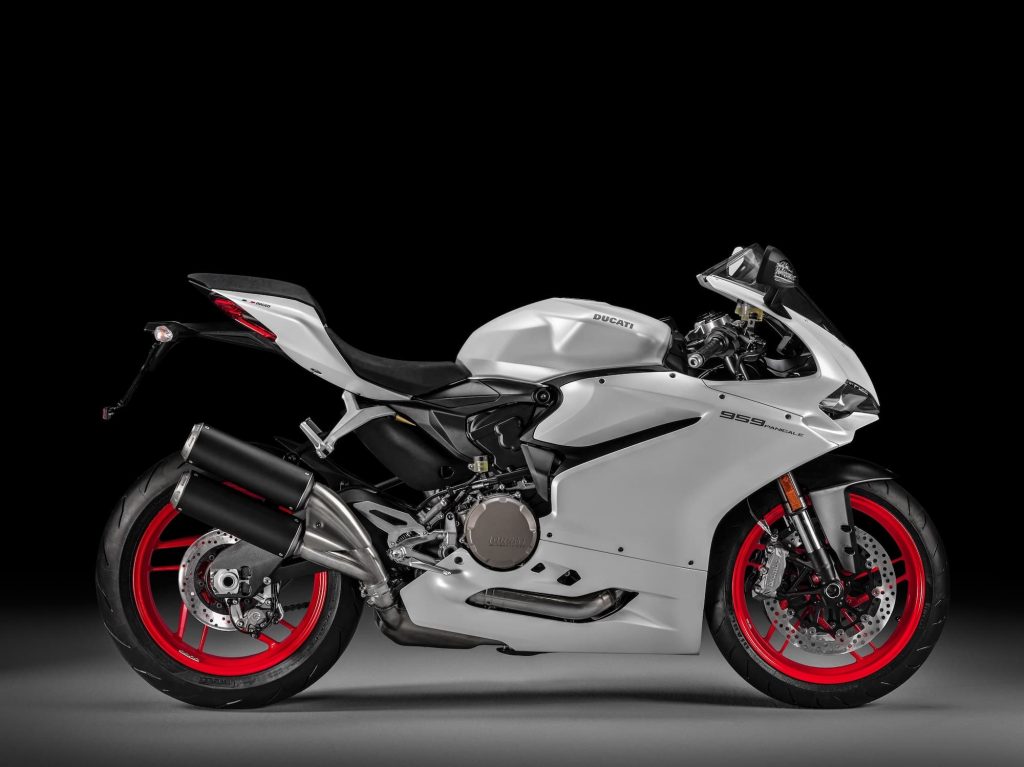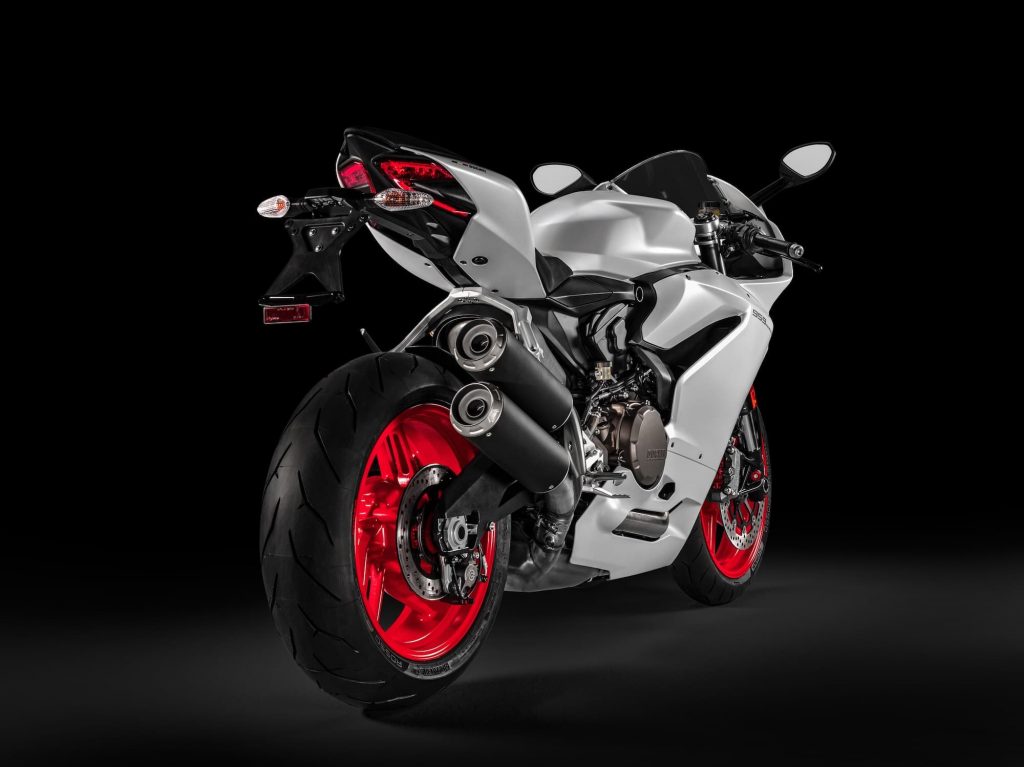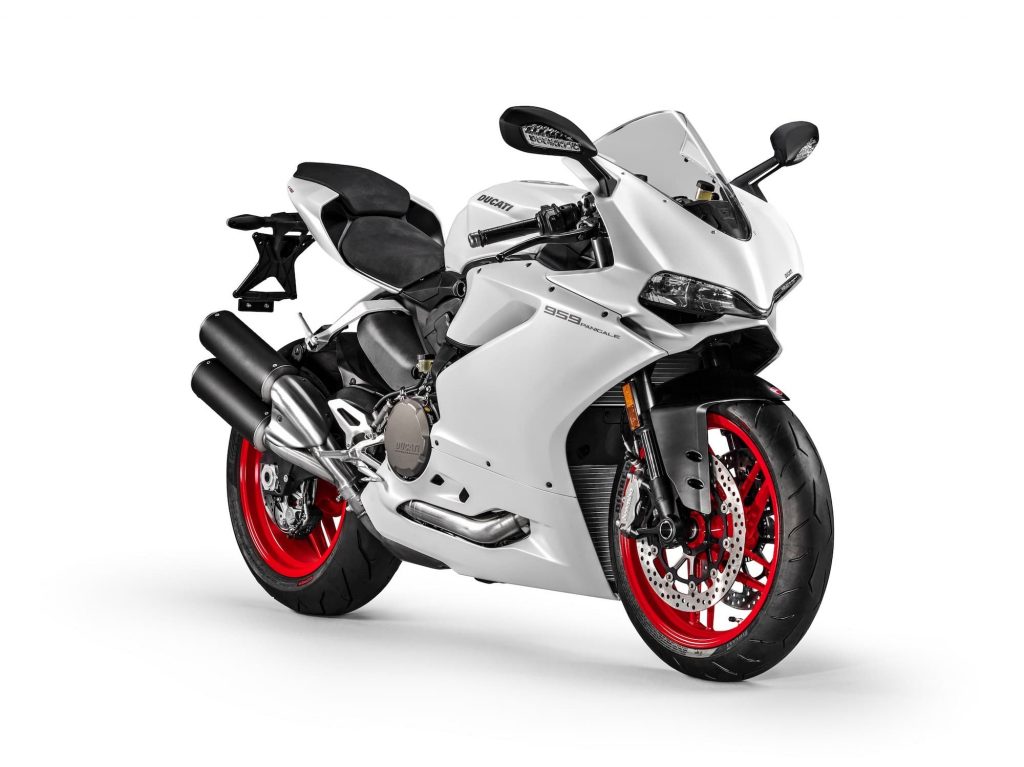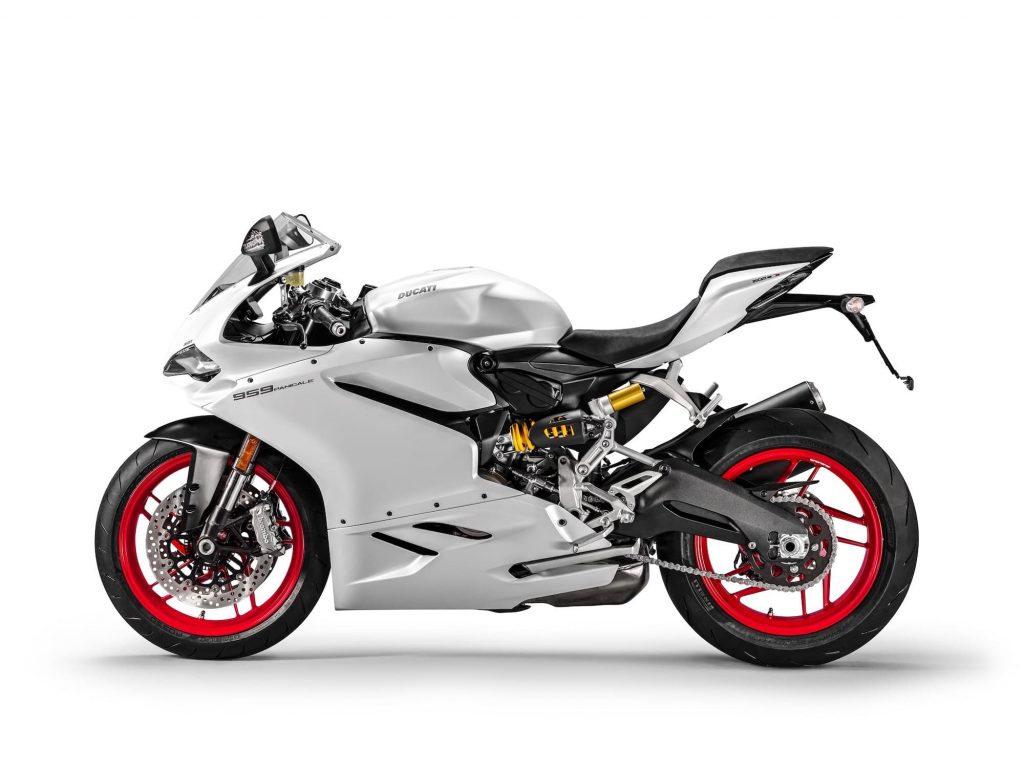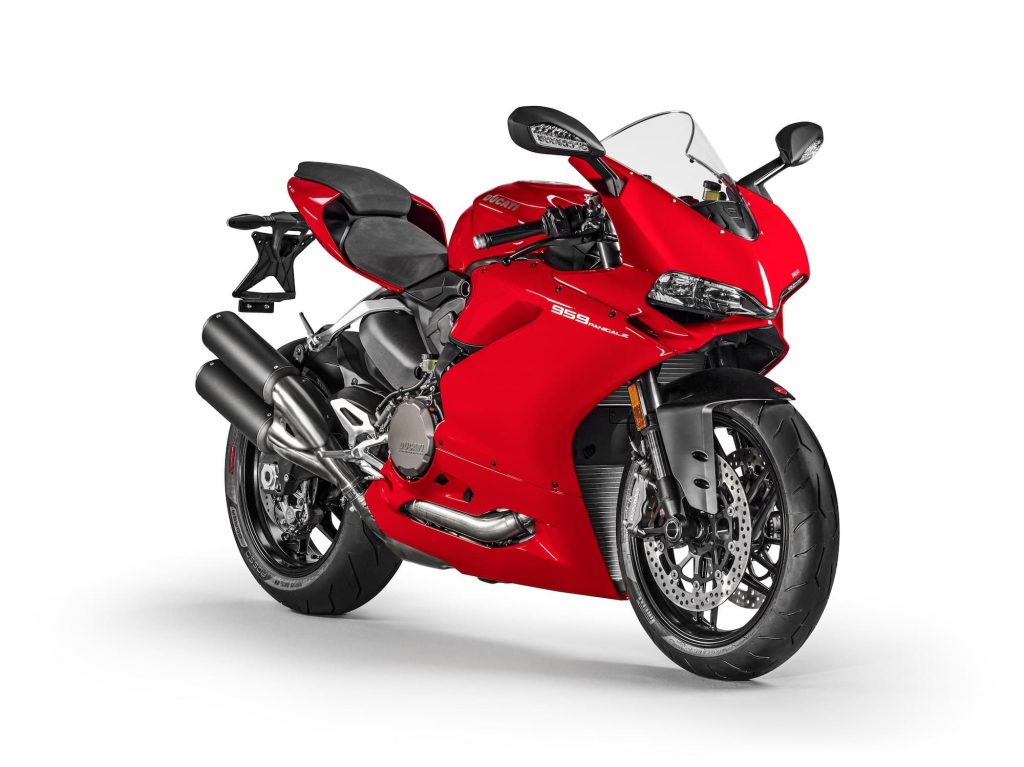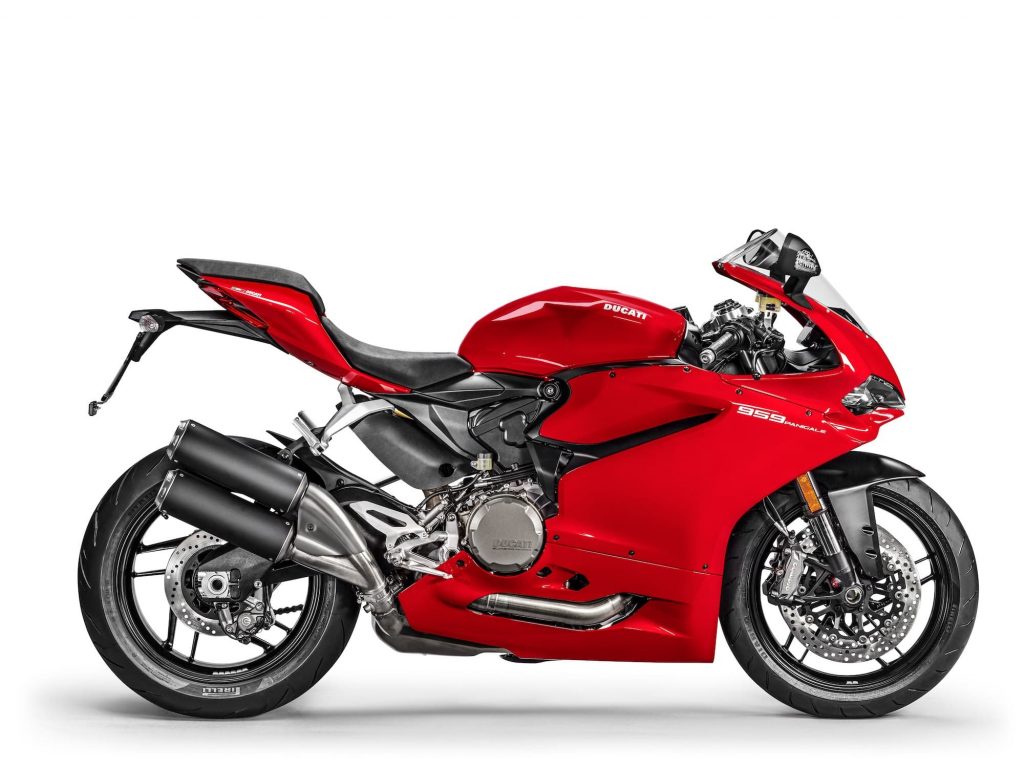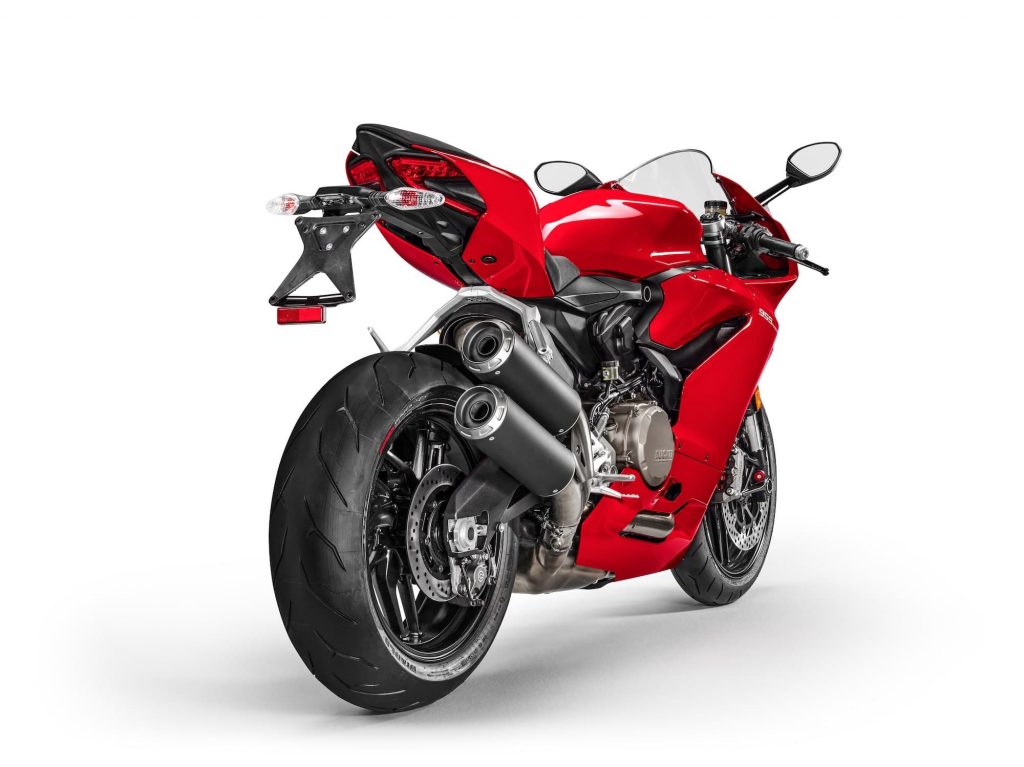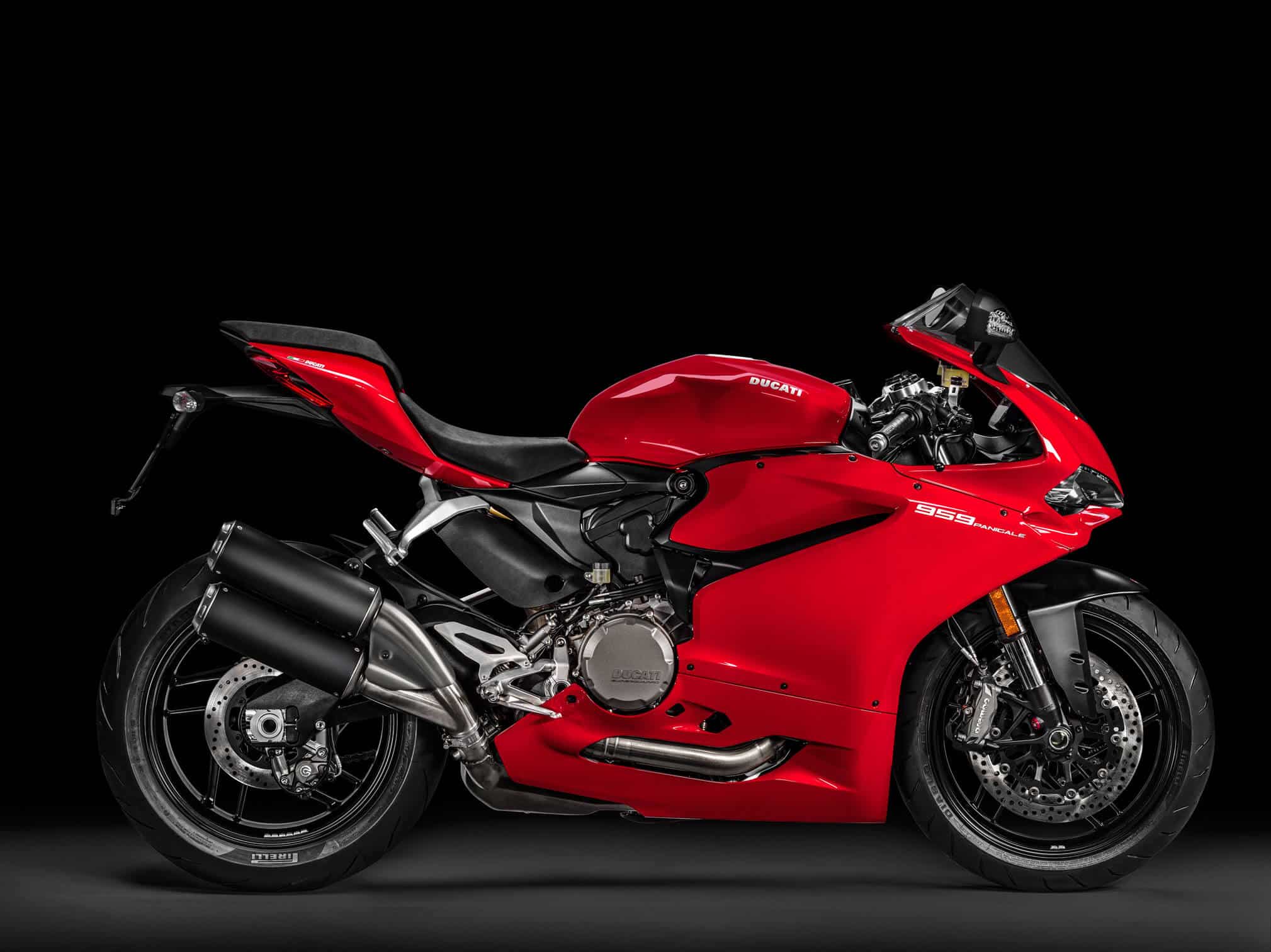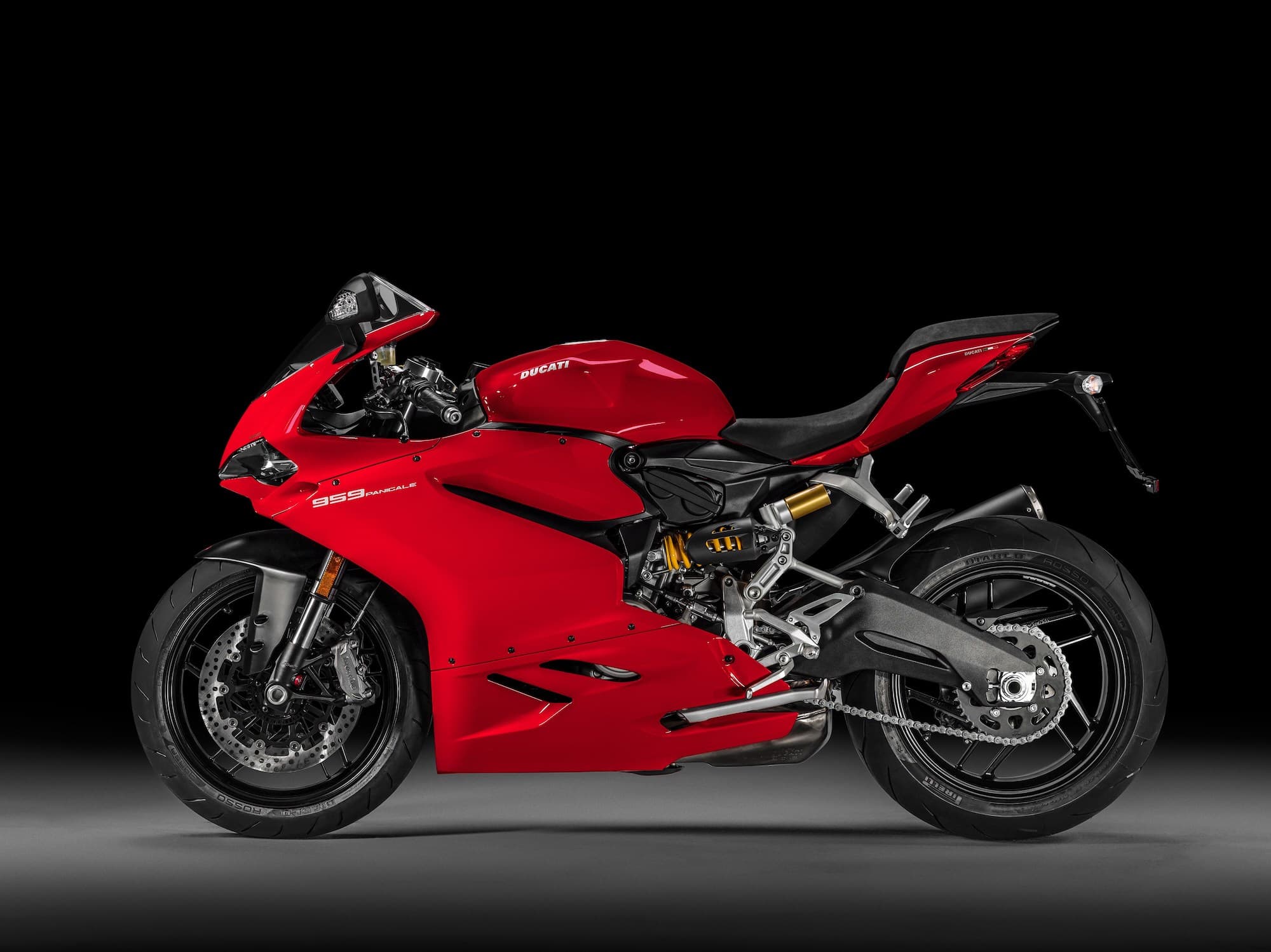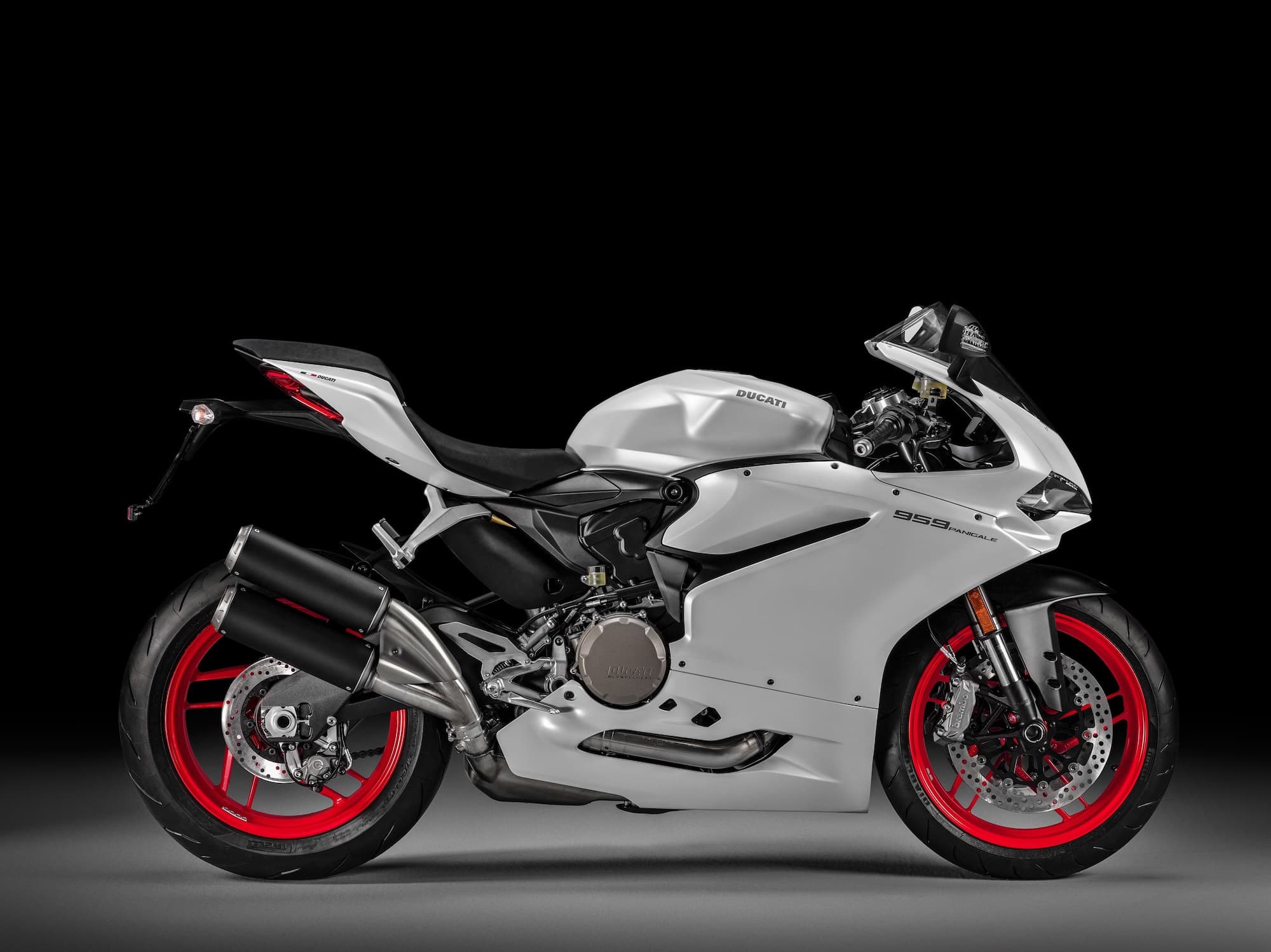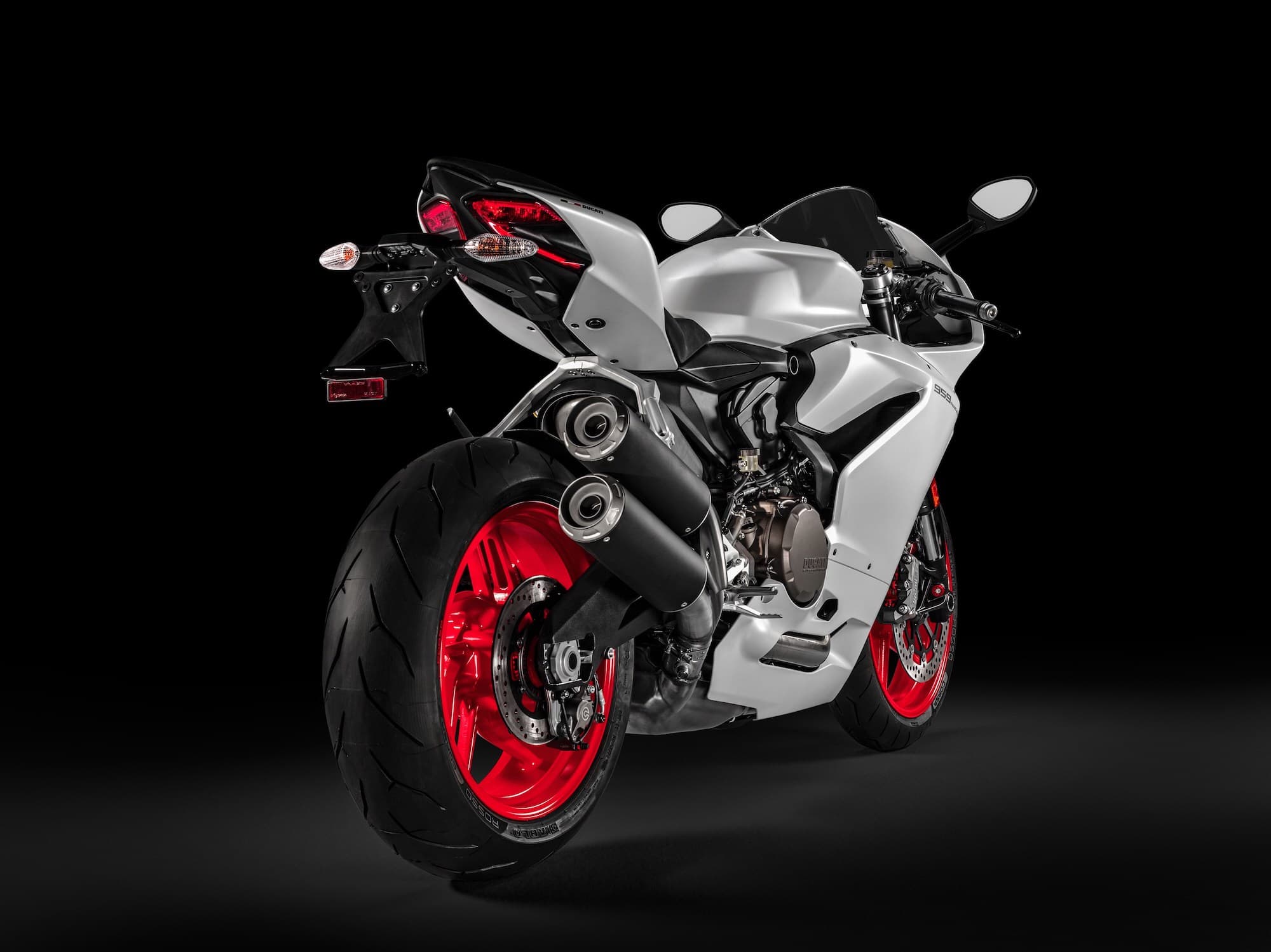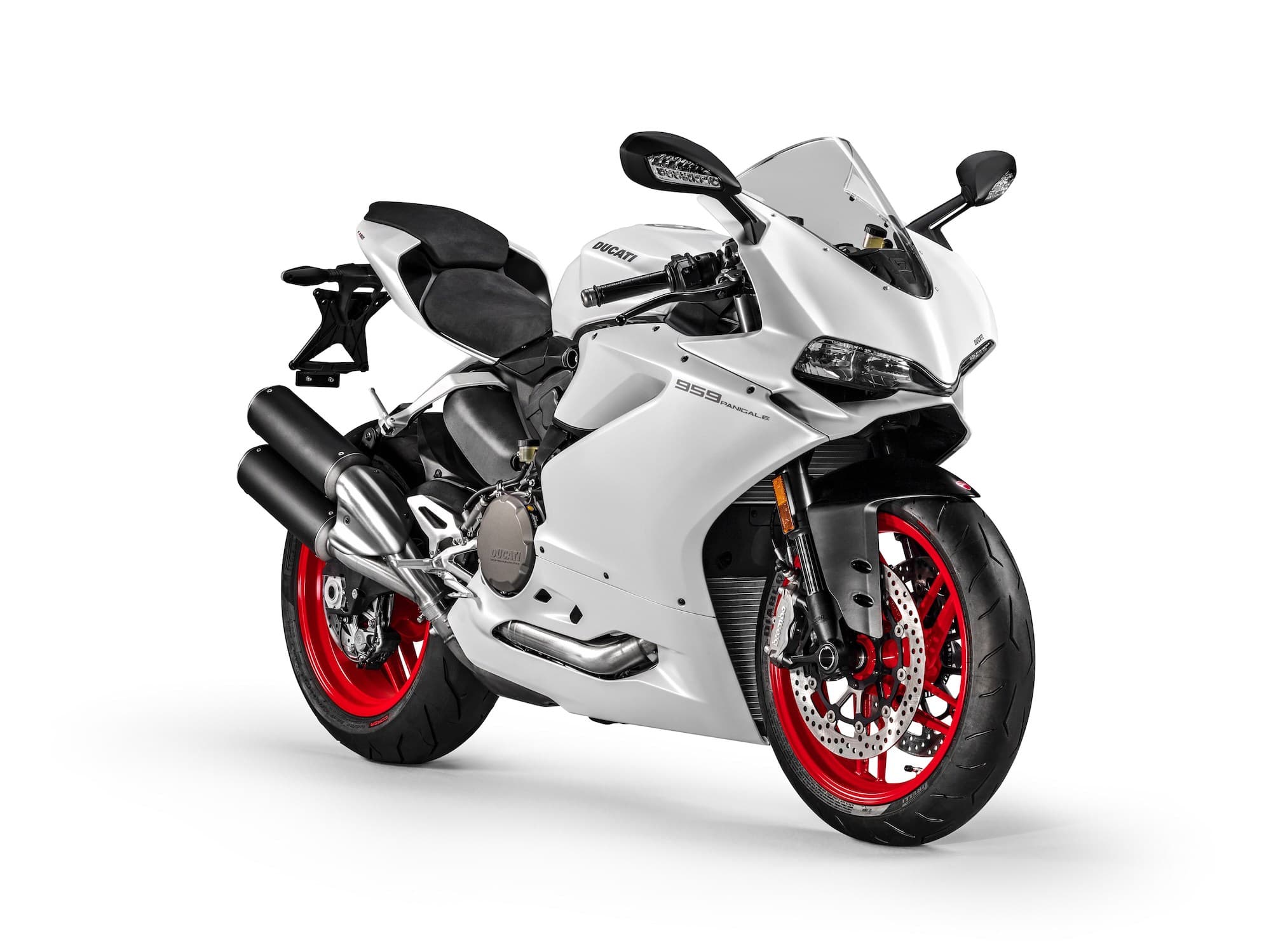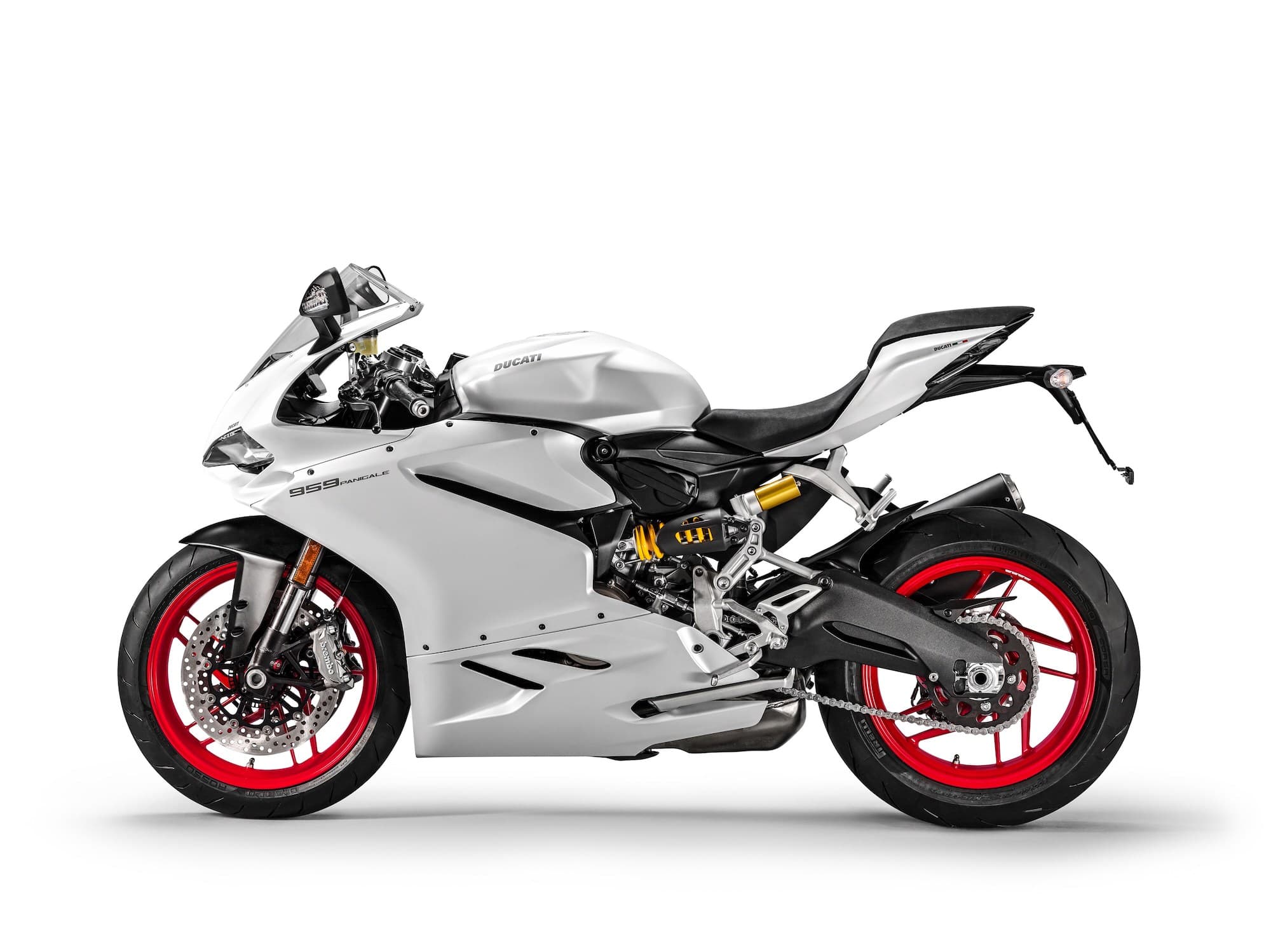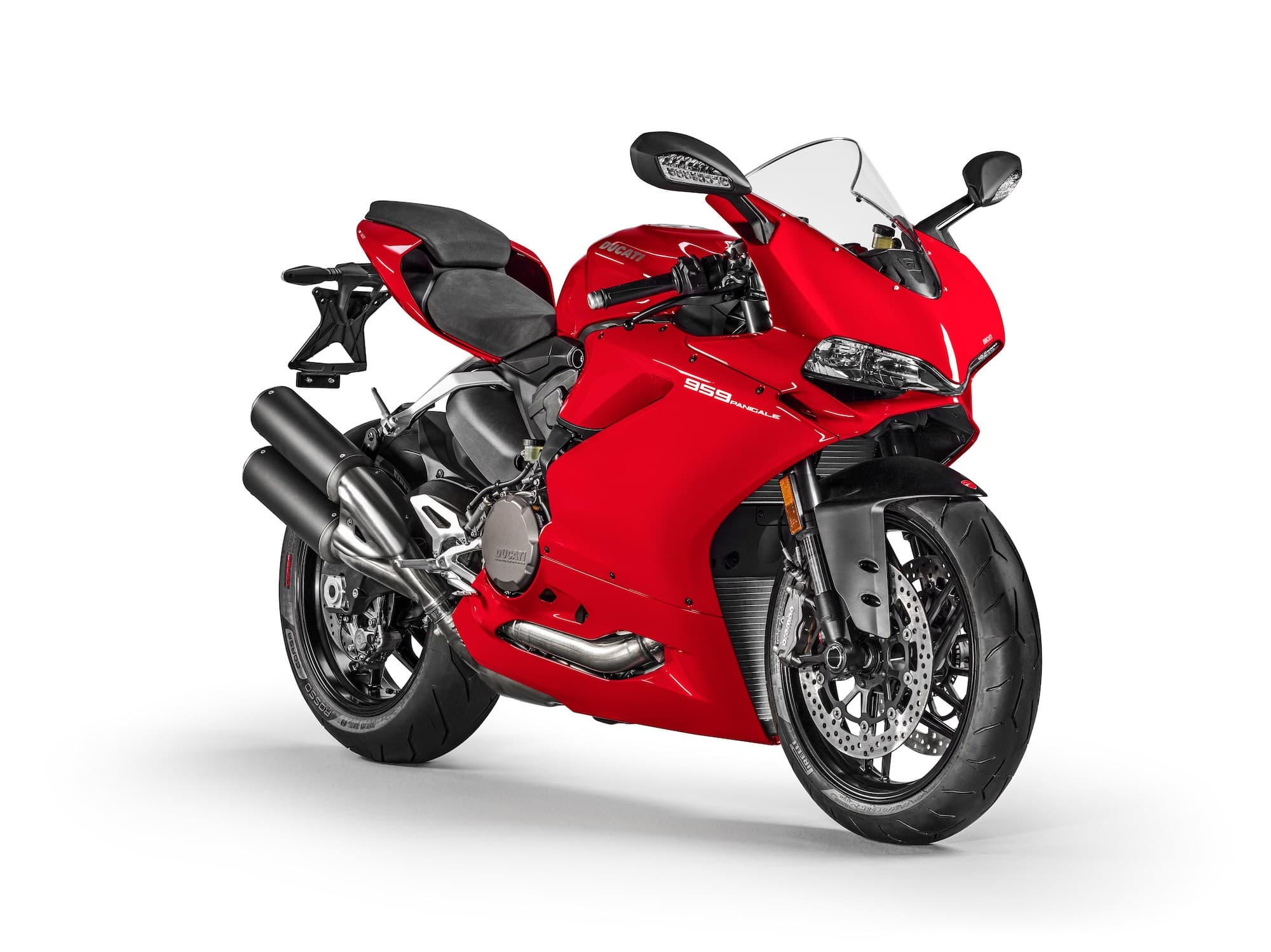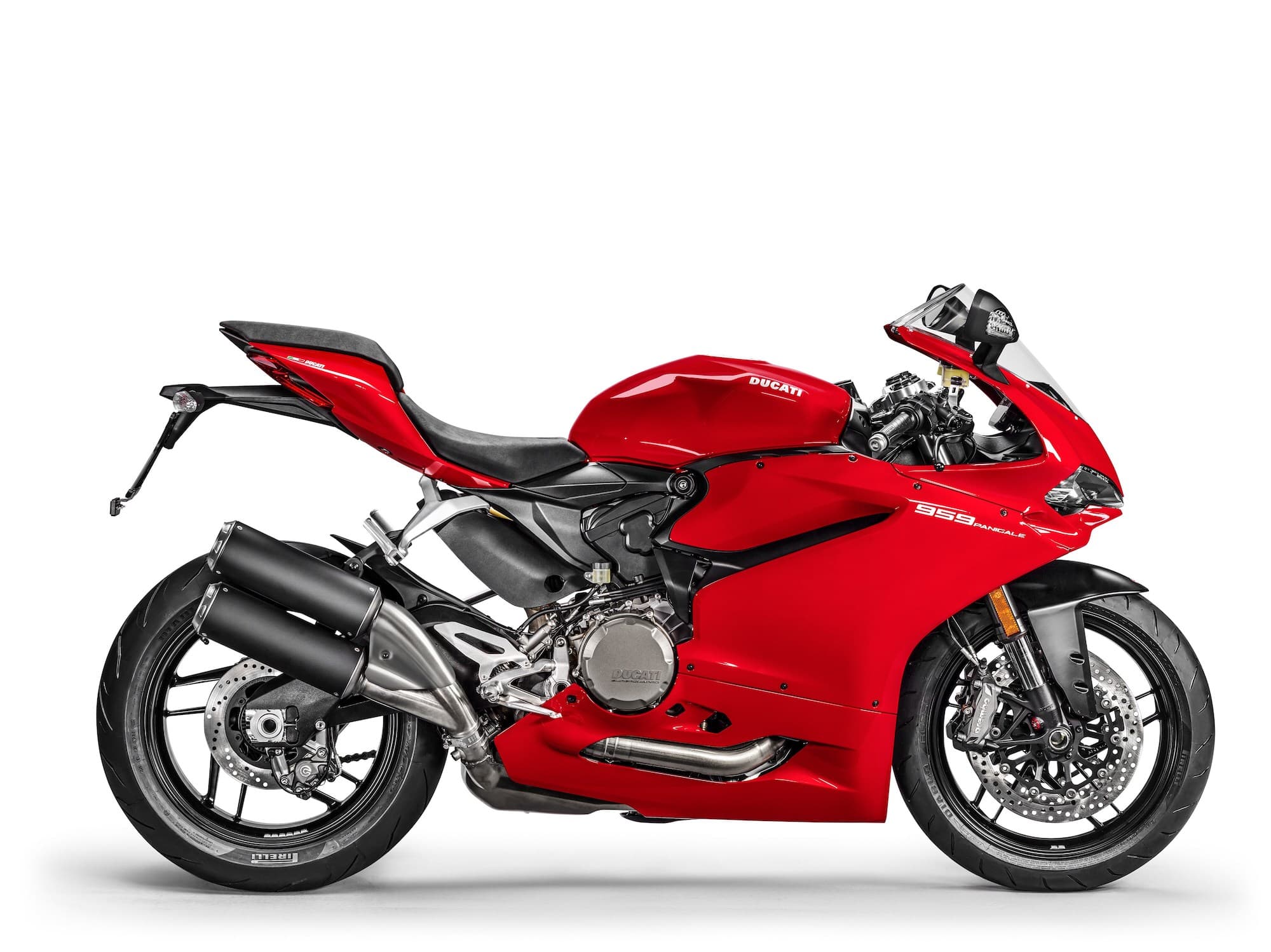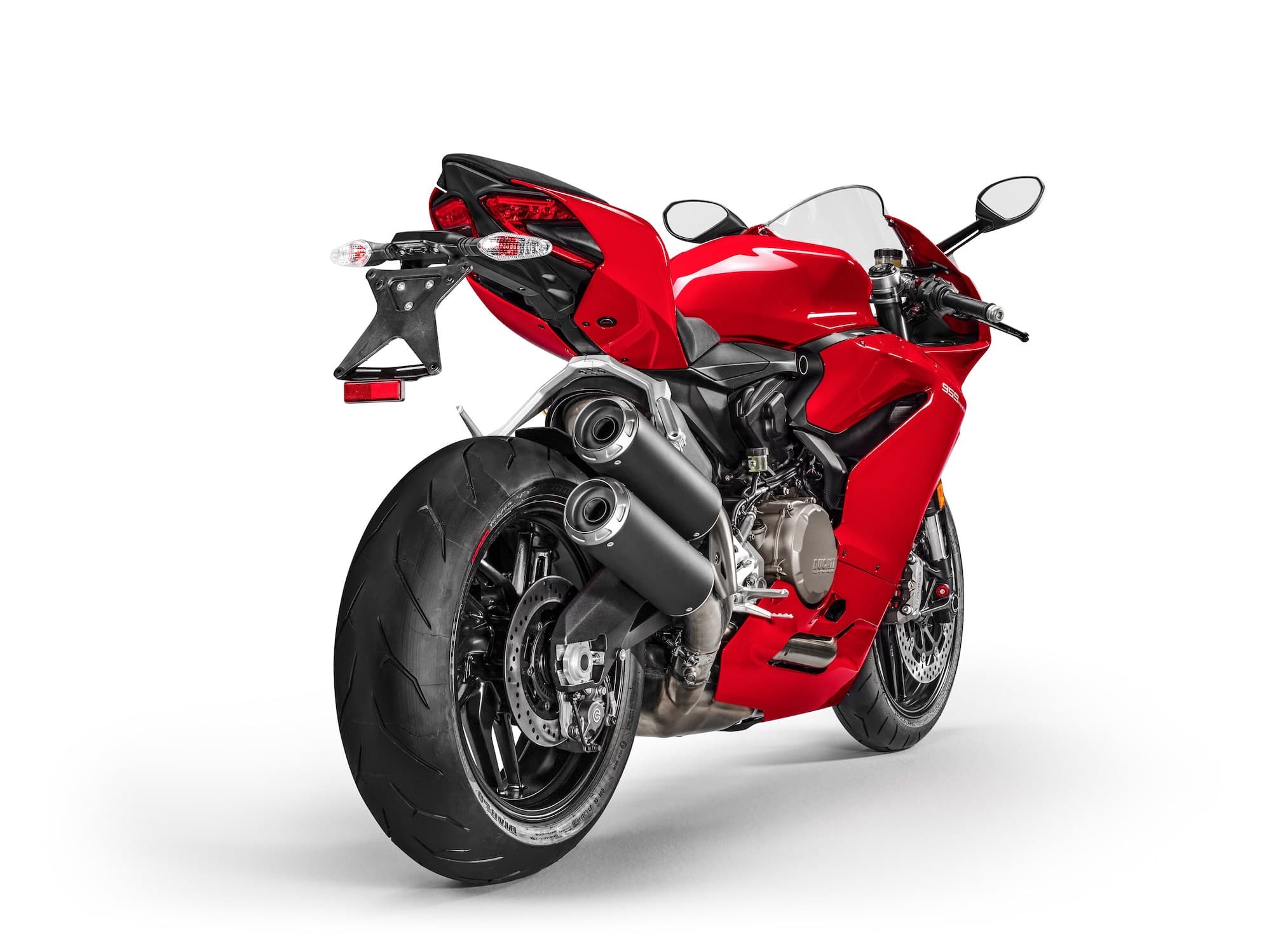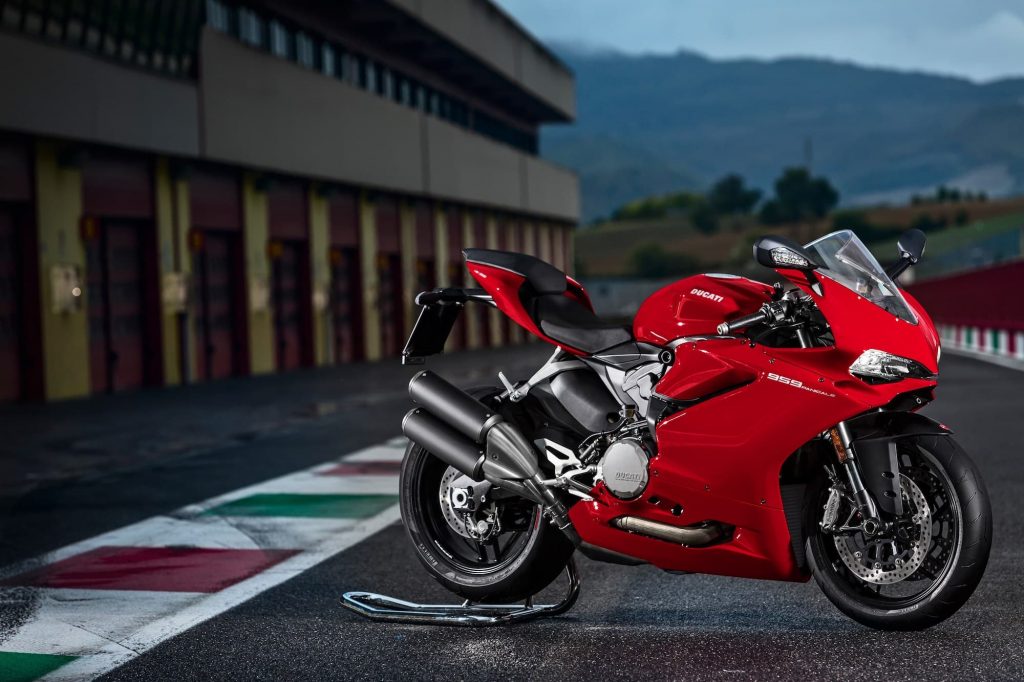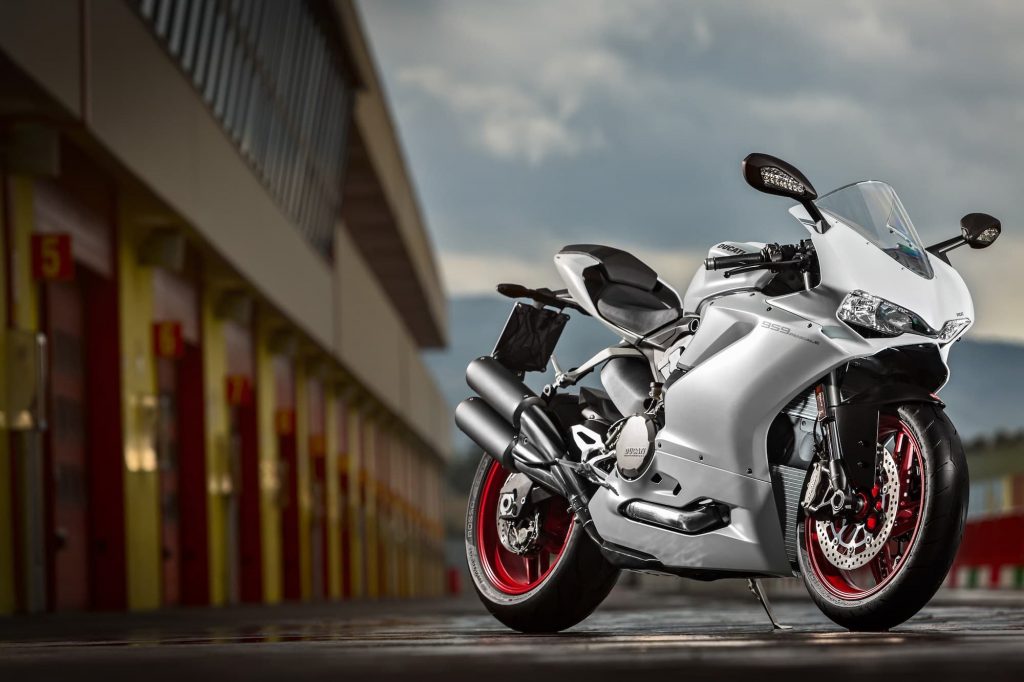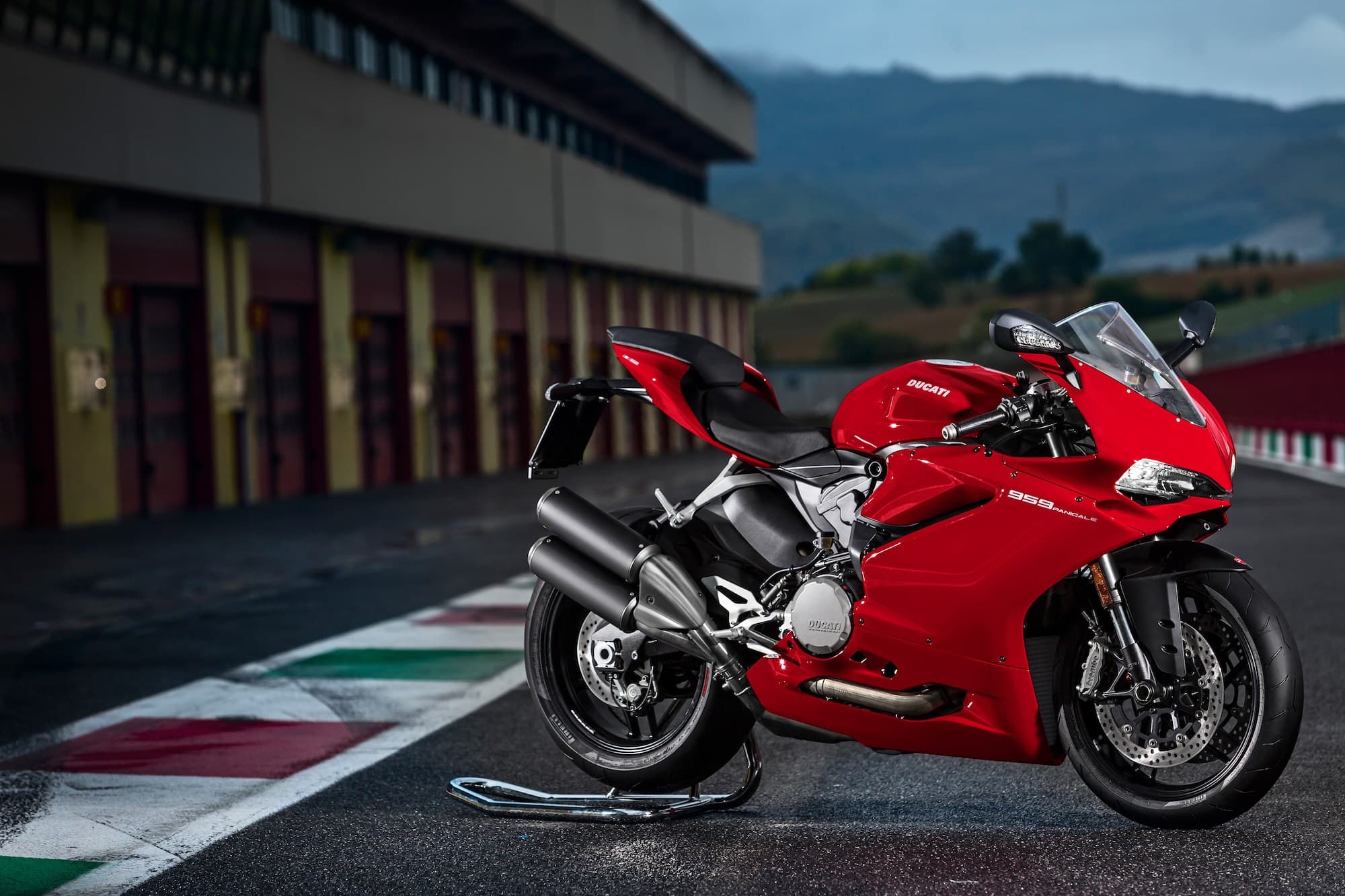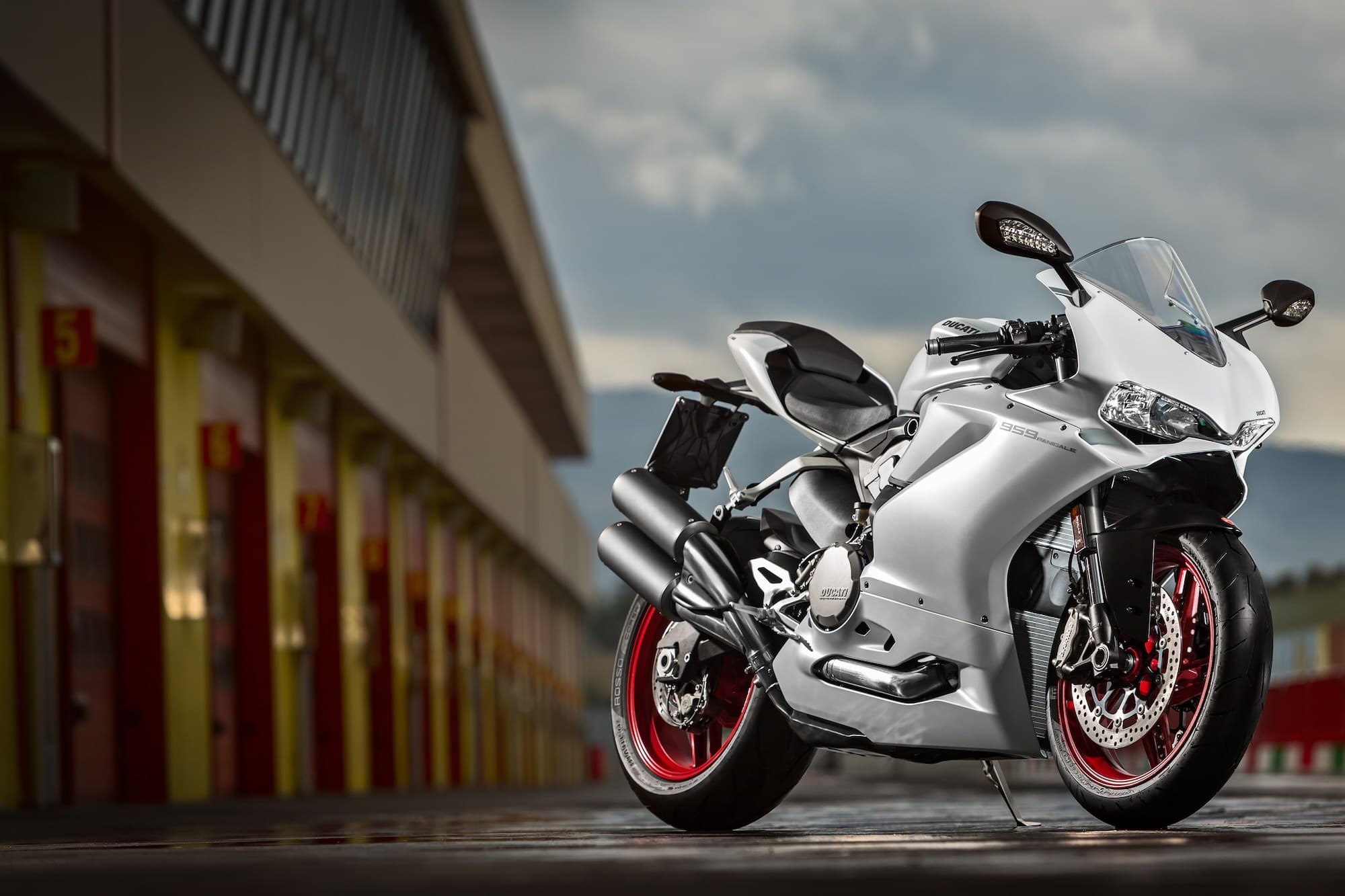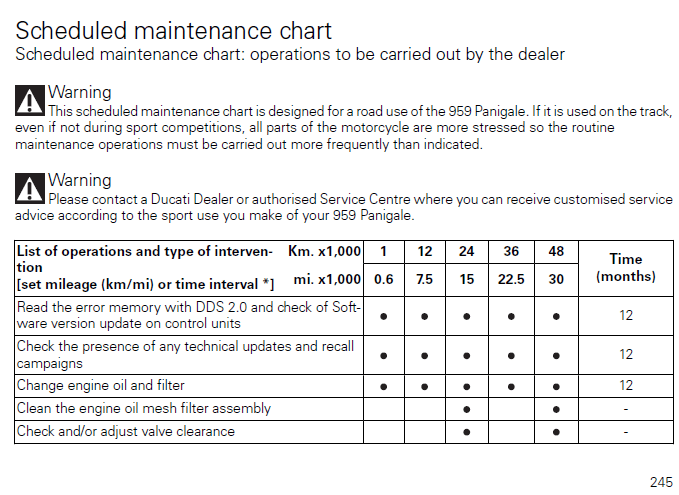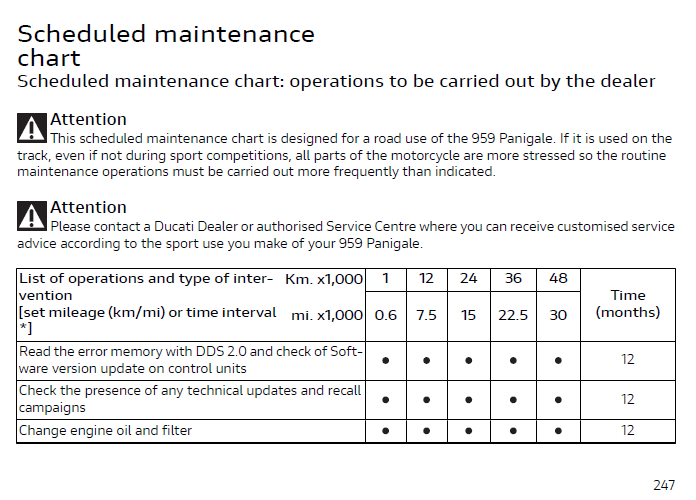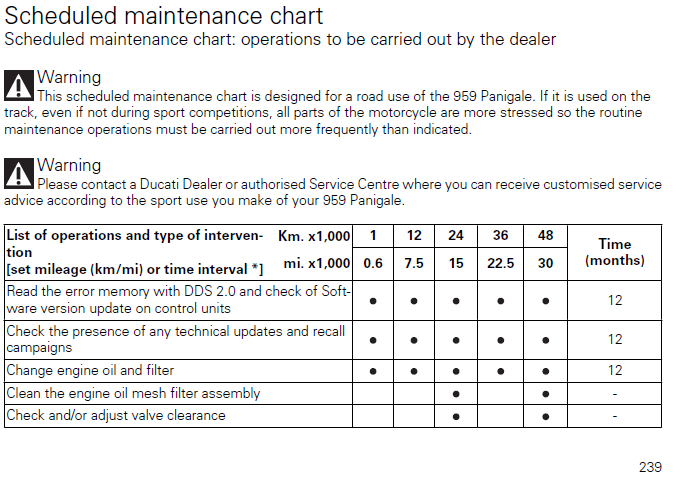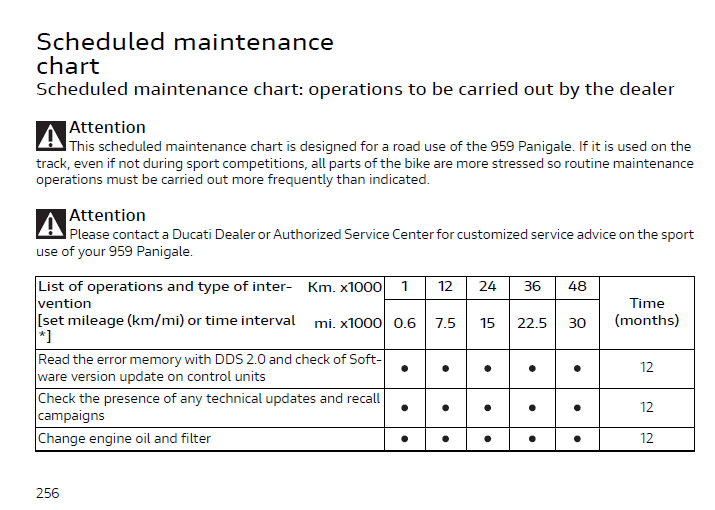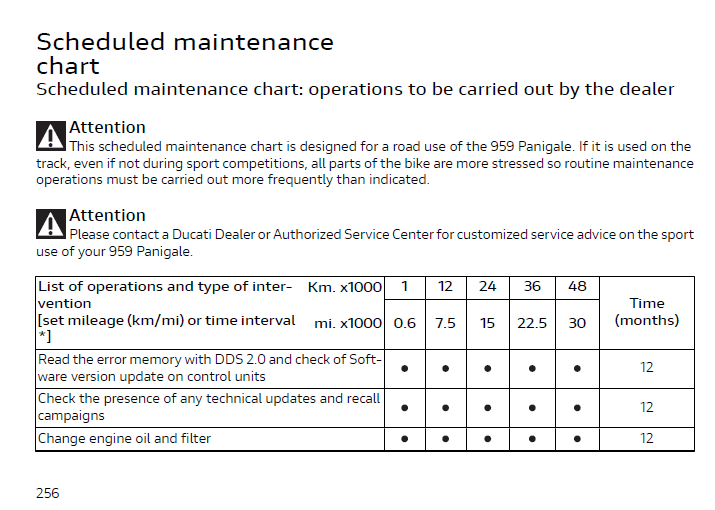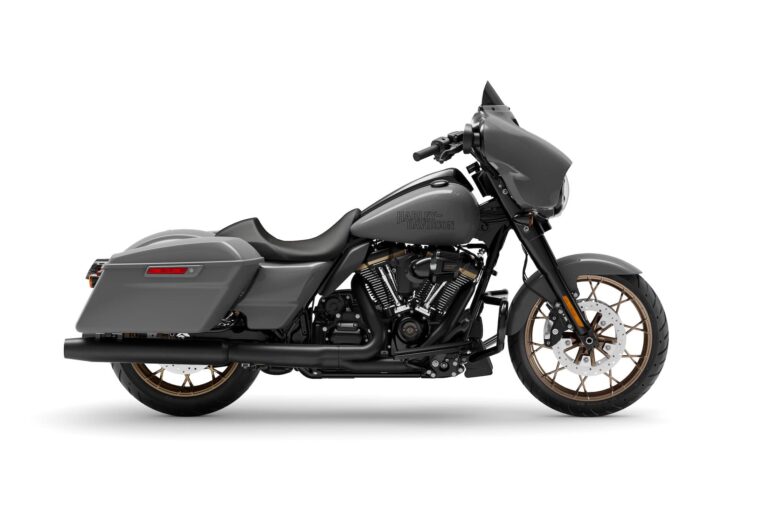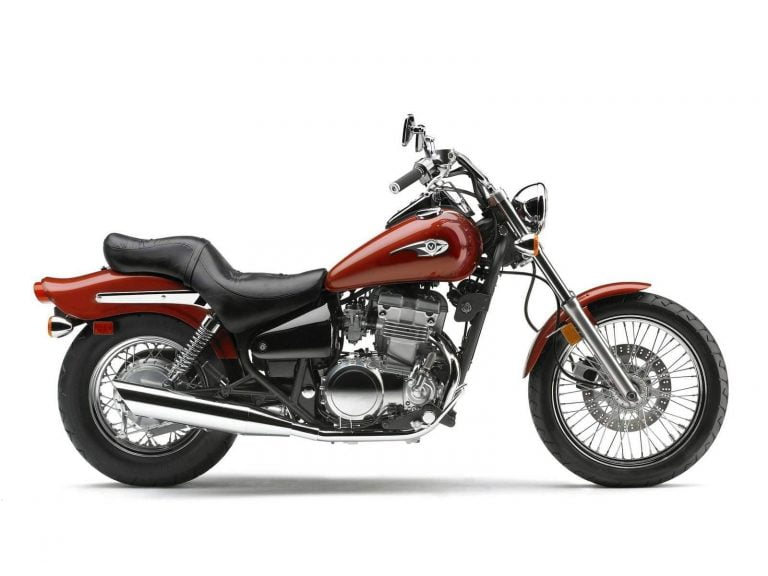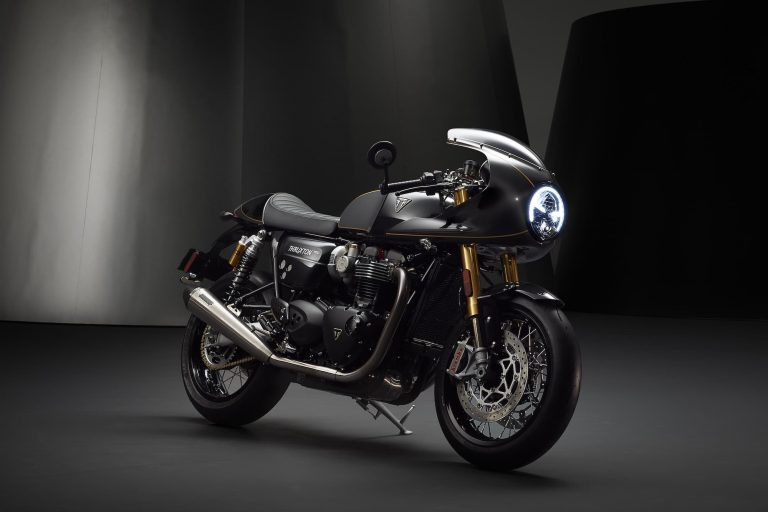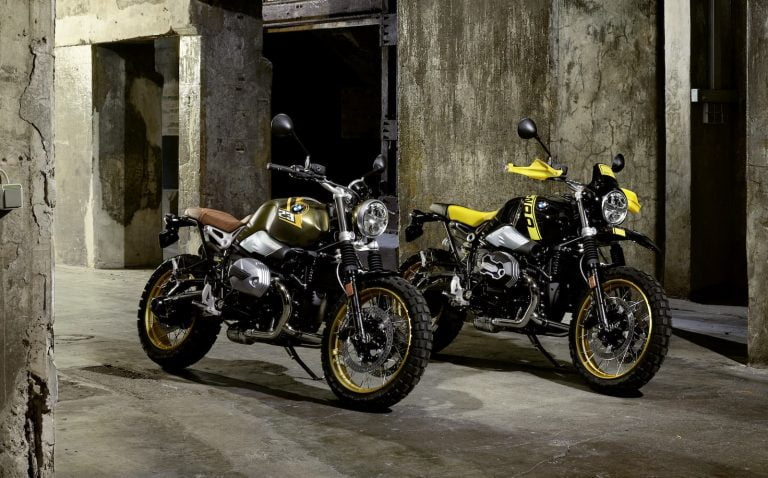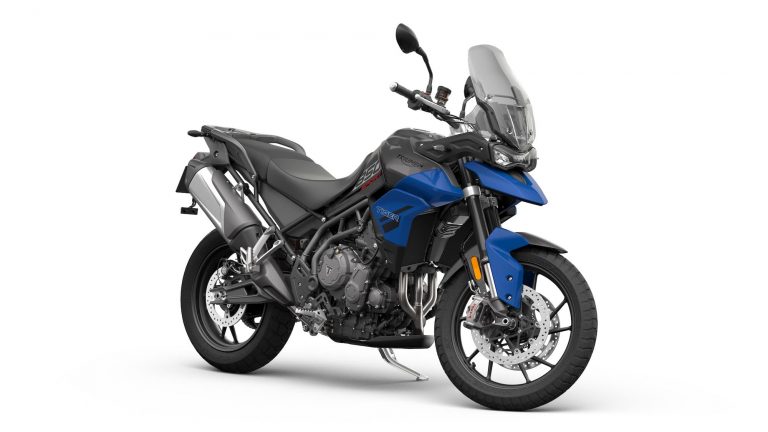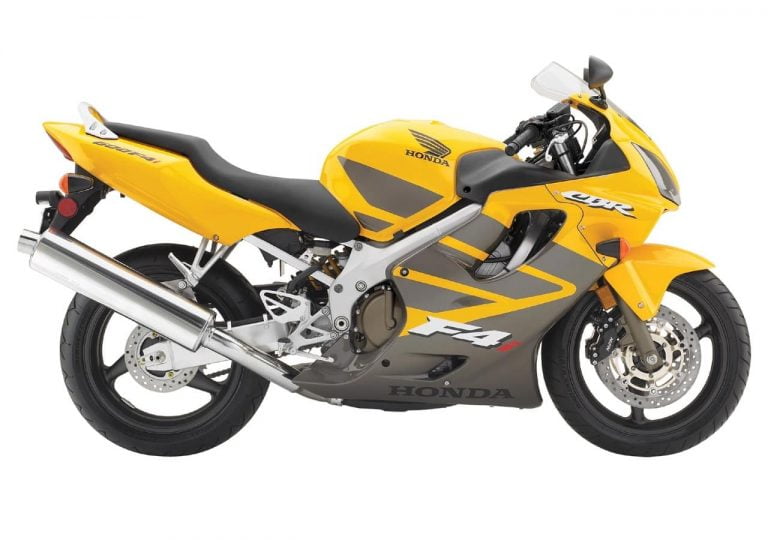Ducati 959 Panigale (2016-2019) Complete Maintenance Schedule
The Ducati 959 Panigale maintenance schedule and service intervals — sourced from the owner’s manual, referencing parts lists.
The Ducati 959 Panigale replaced the Ducati 899 Panigale in 2016. Like its predecessor, it plays the part of the “little sibling” to the bigger Ducati superbikes, but any observer would agree that 955 cc and 150 horsepower is big enough for a lot of people.
The Ducati 959 Panigale is called just that, with no S models available (typically a Ducati S superbike has uprated suspension and lighter wheels). Though the 959 Panigale did also come in the guise of the Ducati 959 Panigale Corse, which has Öhlins suspension, Akrapovič mufflers, a lighter battery, and a great paint scheme that is hard to pull your eyes off.
The Ducati 959 Panigale has the “Superquadro” 955cc V-twin Desmodromic engine that makes 117 kW (157 bhp) and 107 Nm (79 lb-ft) of torque. Both the front and rear suspension are fully adjustable, with Showa BPF up front and a Sachs monoshock at the rear — high spec gear, even without the Corse model’s Öhlins.
From 2020, the 959 Panigale was replaced by the Ducati Panigale V2, which kept the same engine, but tuned for a little more peak power. It also got a full IMU package and re-claimed its single-sided swingarm, as well as a shorter exhaust to expose the rear wheel.
This site has links for things like oil and spark plugs from which we earn a commission (which unfortunately nobody can save, not even us). If you appreciate this work, then please use those links. Thanks!
Ducati 959 Panigale Service Intervals
The Ducati 959 Panigale (including high-spec models) has 7500 mile / 12000 km or annual service intervals. At every service, change the oil and filter, and do a series of checks on the safety, suspension, and drivetrain systems.
The major “Desmo” service for the Ducati 959 Panigale is every 15000 miles or 24000 km. That’s when you change the plugs and air filter, and check the valve clearances.
Luckily, Ducati moved to a gears and chain-driven valve timing system from the time of the 1199 / 899 Panigale, improving on the belt timing system from earlier Ducati Superbikes. You thus don’t need to check belt wear or replace timing belts periodically.
Ducati mandates a 30000 mile / 48000 km inspection interval for the timing chain in the 959 Panigale, though.
Also, regularly change the fluids — brake fluid, clutch fluid (the 959 has a hydraulic clutch), and the coolant.
What you need to service the Ducati 959 Panigale
If you’re planning on doing a basic service for the Ducati 959 Panigale, here are the fluids and replaceable items that you need to do the job.
The manual recommends certain things, but they’re not always available or even what mechanics in every country will use.
Here’s what you need to service the 959 Panigale.
| Part | Ducati 959 Panigale spec |
|---|---|
| Engine oil | Ducati recommends “Shell Advance DUCATI 15W-50 Fully Synthetic Oil”, or another oil that is the 15W-50, meets API standard SN, and/or JASO standard MA2. A good option is Mobil 1 15W-50 Full Synthetic or Motul 300V 15W-50. |
| Oil filter | The Panigale 955 cc engine uses the same oil filter as many other high-end Ducatis, with part number 44440312B. You can use a HifloFiltro HF159 as an easy-to-obtain replacement. |
| Spark plugs | Standard spark plugs are NGK MAR9A-J. |
| Air filter | Ducati part number for the air filter is 42610491A. DNA filters are popular replacements — use part number P-DU11S12-01. |
| Brake/ Clutch fluid | Ducati specifies using DOT 4, so use something high quality like Castrol DOT 4 full synthetic. |
| Coolant | The manual recommends ENI Agip Permanent Spezial Antifreeze or an equivalent. For track use, many use distilled water and Redline Water Wetter, which contains corrosion inhibitors. |
| Front brake | Part # for the front brake pad set is 61340121A. You can also use EBC HH brake pads with part number FA630HH. |
| Rear brake | Part # for the rear brake pad set is 61340381A. The EBC part code for HH pads is FA266HH. |
| Chain management | Ducati doesn’t specify a chain lube, so use something well-liked like Motul chain paste, or maybe clean it with a Motul chain care kit. |
| Battery | Dead battery? If it hasn’t happened, it will happen. The replacement you need is a Yuasa YT7B-BS (12V – 6.5Ah 10HR) (common to many Ducati motorcycles) |
| Fork oil | Use Shell Donax TA. |
Regular maintenance for the Ducati 959 Panigale
This is maintenance that you can do yourself (though the manual says you need a dealer to do it).
The best part is that the Ducati 959 has timing chains, like its predecessor the 899, so no belts to replace.
But maintaining the 959 Panigale is not for the faint of heart. A brief look at forums shows that doing things like changing spark plugs can take many hours of labour, as you have to undo quite a lot (not just the fairings!) to get at them. Don’t try this unless you’re patient.
The manual recommends that if you use the motorcycle under extreme conditions, like damp or muddy roads, or a dry/dusty environment, to service it more often — paying attention particularly to the air filter. “If the air filter is dirty, the engine could get damaged.”
The regular maintenance for the Ducati 959 Panigale is as follows.
Every 1 000 km / 600 miles OR 6 months (whichever comes earlier), perform the following maintenance:
| Ducati 959 Panigale regular maintenance |
|---|
| Check engine oil level (spec is Shell Advance 4T Ultra 15W-50, or an equivalent like Mobil 1 Synthetic 15W-50) |
| Check brake and clutch fluid level (top up with Castrol DOT 4) |
| Check tyre pressure and wear |
| Check the drive chain tension and lubrication. Lubricate with chain lubricant. Replace if necessary. (a Motul chain care kit is a good thing to have on hand) |
| Check brake pads. If necessary, replace. (Front: 2x 61340121A, rear: 61340381A) |
Ducati 959 Panigale Maintenance Schedule Table
This is the full maintenance schedule for the Ducati 959 Panigale.
Services for the 959 Panigale are at multiples of 12000 km (7500 mi) or twelve months, or multiples thereof. Every time that distance or a year has passed, check to see what’s due.
Note: This scheduled maintenance chart is designed for a road use of the 959 Panigale. If it is used on the track, even if not racing, all parts of the bike are more stressed so the routine maintenance operations has to be carried out more frequently.
Other notes:
- The break-in service has been omitted (it should have been done by now, and dealers usually do it during the warranty period)
- [D] means you need dealer-specific tools and equipment.
- There’s no need to check or replace belts on the 959 Panigale’s engine. Just check the chain timing system every 48000 km / 30000 mi.
| km x 1000 | 12 | 24 | 36 | 48 | Time |
|---|---|---|---|---|---|
| mi x 1000 | 7.5 | 15 | 22.5 | 30 | (months) |
| [D] Read the error memory with DDS 2.0 and check of Software version update on control units | • | • | • | • | 12 |
| [D] Check the presence of any technical updates and recall campaigns | • | • | • | • | 12 |
| Change engine oil and filter (Shell Advance 4T Ultra 15W-50 or Mobil 1 15W-50 oil and part 44440312B oil filter) | • | • | • | • | 12 |
| Clean the engine oil mesh filter assembly | • | • | |||
| Check and/or adjust valve clearance | • | • | |||
| Visual check for wear of the chain timing system | • | ||||
| Change spark plugs (NGK MAR9A-J) | • | • | |||
| Clean air filter | • | • | |||
| Change air filter (OEM part 42610491a or K&N DU-1112) | • | • | |||
| Check the proper tightening of the clutch cover and clutch protection cover bolts | • | • | • | • | |
| Check the proper tightening of the oil sump bolts | • | • | |||
| Check brake and clutch fluid level | • | • | • | • | 12 |
| Change brake and clutch fluid (Castrol DOT 4) | 24 | ||||
| Check brake pads. Change, if necessary (Front: 2x 61340121A, rear: 61340381A) | • | • | • | • | 12 |
| Check the proper tightening of brake calliper bolts and brake disc flange screws | • | • | • | • | 12 |
| Check front and rear wheel nuts tightening | • | • | • | • | 12 |
| Check wheel hub bearings | • | • | |||
| Check and lubricate the rear wheel shaft (lithium soap-based grease) | • | • | 24 | ||
| Check the cush drive damper on rear sprocket | • | • | |||
| Check the proper tightening of secondary drive front and rear sprocket nuts | • | • | • | • | 12 |
| Check chain sliders for wear | • | • | • | • | 12 |
| Check the drive chain tension and lubrication | • | • | • | • | 12 |
| Check steering bearings and lubricate, if necessary | • | • | 24 | ||
| Change the front fork fluid (Shell Advance Fork 7.5 or Shell Donax TA) | 36 | ||||
| Visually check the front fork and rear shock absorber seals | • | • | • | • | 12 |
| Check the freedom of movement and tightening of the side stand | • | • | • | • | 12 |
| Visually check the fuel lines | • | • | • | • | 12 |
| Check rubbing points, clearance, freedom of movement and positioning of hoses and electric wiring in view | • | • | • | • | 12 |
| Lubricate the levers at the handlebar and pedal controls (Lithium soap-based grease) | • | • | • | • | 12 |
| Change the coolant (ENI Agip Permanent or alternative OAT coolant) | • | 36 | |||
| Check the coolant level | • | • | • | • | 12 |
| Check electric fan operation | • | • | • | • | 12 |
| Check tyre pressure and wear | • | • | • | • | 12 |
| Check the battery charge level | • | • | • | • | 12 |
| Check idling | • | • | • | • | 12 |
| Check secondary air system operation | • | • | |||
| Check the operation of all electric safety devices (side stand sensor, front and rear brake switches, engine kill switch, gear/neutral sensor) | • | • | • | • | 12 |
| Check lighting, turn indicators, horn and controls | • | • | • | • | 12 |
| [D] Reset the Service indication through the DDS 2.0 | • | • | • | • | 12 |
| Road test of the motorcycle, testing the safety devices (ex. ABS and DTC) | • | • | • | • | 12 |
| Clean the motorcycle | • | • | • | • | 12 |
| [D] Fill out Warranty Certificate with service data | • | • | • | • | 12 |
About the Ducati 959 Panigale
The Ducati 959 Panigale an evolution of 899 Panigale but with a larger 955cc engine.
The 959 Panigale is meant to be the “street”-friendly version of the bigger superbikes, and it definitely is. The 899 Panigale and the 959 Panigale both are very easy to ride on the street, compared to their bigger siblings that can be unrefined at lower speeds and send you to an early grave when all you’re trying to do is tiptoe your way around an urban roundabout.
At 10,000 rpm in first gear the Ducati 959 Panigale is doing around 100 km/h — maybe 15-20% shy of superbikes, but that slightly shorter gearing does make it more accessible.
But the 959 is no pussycat. With as much power as earlier generation superbikes only a decade ago, the 959 can be fierce at the track as well. It’s just that you can take it to the farmers market too, if you feel like making an entrance.
The interesting thing is that the Ducati 959 Panigale has quite a few interchangeable parts with its bigger stablemates. Some people put full exhaust systems from a 1299 Panigale onto their 959, and with a re-map, they get a cost-effective (compared to a full aftermarket exhaust system) upgrade.
As the “middleweight” bike, the Ducati 959 Panigale does suffer from getting some mid-spec components. The front brakes, for example, are Brembo M4.32 callipers, which while competent, aren’t the highest spec available (with Brembo M50 brake callipers going on the 1299 Panigale, for example).
Similarly, the front suspension is via 43mm Showa “Big Piston” forks. They’re fully adjustable, but they’re not Öhlins. The rear shock is a fully adjustable Sachs monoshock.
All of those are totally adequate for the average rider who rides quite aggressively and even goes to track days. But of course, they’re not the top-spec components that you get on Ducati’s leading edge superbikes.
If you want higher spec riding gear, look no further than the Ducati 959 Panigale Corse. It has Öhlins front and rear suspension and an Akrapovič silencer. But the brakes are the same M4.32 spec.
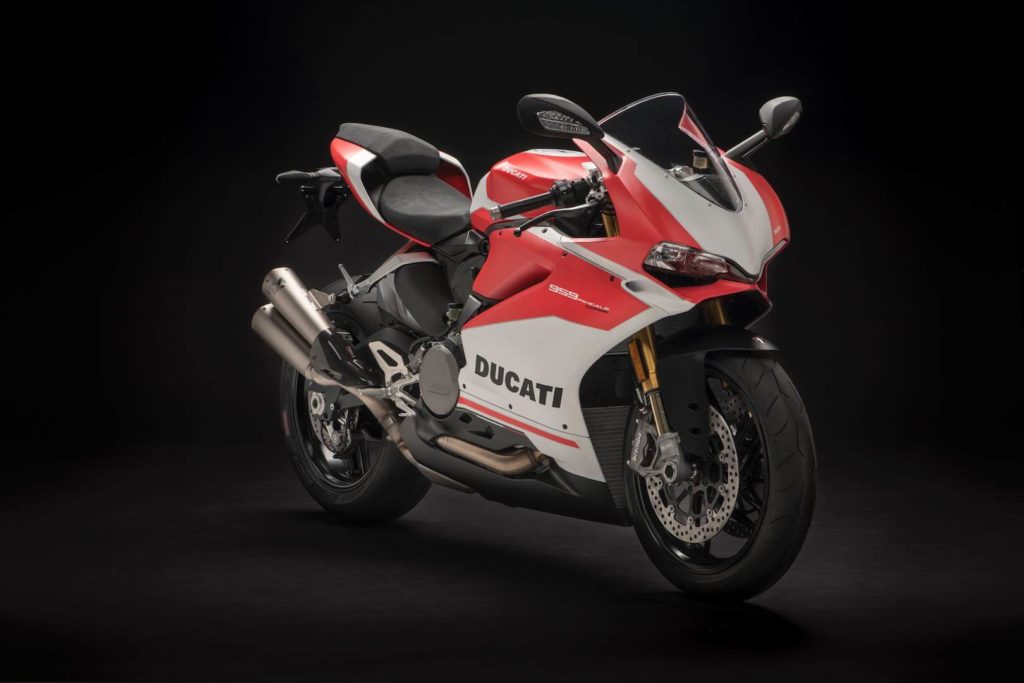
The Ducati 959 Panigale was replaced by the Ducati Panigale V2 in 2020.
Ducati 959 Panigale Owner’s Manual
The above info was sourced from the owner’s manual.
Note the warnings in the manual saying you should get the Ducati service centre to do maintenance. Proceed with caution!
You can download manuals for the Ducati 959 Panigale models from the Ducati website here.
Here’s an archive copy of the Ducati 959 manual for future reference.
